The WorldTour Awaits: Rally Faces Final Test At GP Quebec And Montreal
The WorldTour Awaits: Rally Faces Final Test At GP Quebec And Montreal
On September 7 and 9, Rally will line-up at Grand Prix Cycliste de Quebec and Montreal, live and on-demand on FloBikes in the U.S.
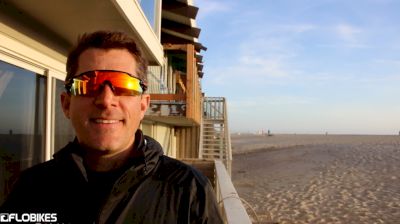
ACT I: California Dreaming
It’s mid-January, 2018, at the Rally Cycling training camp in Oxnard, California. Team director Pat McCarty is behind the wheel of a team car. In front of him, the 16-rider Rally men’s team pedals in a two-by-two formation through the Santa Monica Mountains.
McCarty considers the terrain here just north of L.A. some of the best in the entire U.S., with dozens of long and steep climbs, as well as flat coastal highways for speedwork. (Indeed, Tour de France champion Geraint Thomas trained in these mountains over the winter, and Peter Sagan frequents the scenic roads for private camps.) The dizzying canyon roads remain relatively undeveloped, save the celebrity homes overlooking the Pacific Ocean.
The team dives down the Rock Store descent—the tarmac tattooed by the skid marks of weekend thrill seekers in luxury sports cars—and approaches the Piuma ascent, a 4.5 mile climb at an average gradient of six percent. McCarty, grinning and holding out a fistful of 20 dollar bills, rolls by the group and shouts, “Guys, hundred dollars cash to the first one to the top of Piuma.”
Who is the team director placing his bet on? “Colin Joyce,” McCarty says. “He’s a fast finisher who can make it over shorter climbs.” Then he adds, “Plus, he does anything for money.”
A half dozen riders take the bait, including new team members Emerson Oronte and Robin Carpenter, as well as 20 year old phenom Brandon McNulty and Evan Huffman, who won two stages at the 2017 Amgen Tour of California. McNulty takes the front and Joyce floats on the back, picking up spots as riders come off the group. Approaching the summit, McNulty’s shed everyone but Joyce. McCarty speeds ahead and holds out the cash at the top of the hill.
The bearded face of Joyce bobs over the crest of the climb—exhausted, he reaches for the bills. McNulty comes in 10-seconds later. As Joyce fans the money and poses for photos with the team’s PR crew, the rest of the riders congregate and replay the shenanigans on the ascent. There’s not much animosity or ego, just a bunch guys having fun riding bikes.
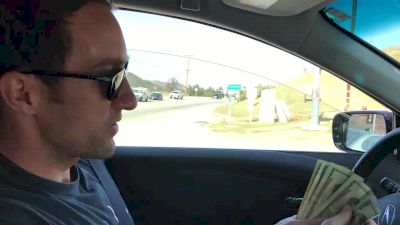
In a week or so, Joyce will head to Spain for a series of early-season stage races, while McNulty will travel to the middle-east. The team’s split squad and international race schedule is part of Rally Cycling’s ambitious move to the second tier of professional cycling, the UCI Pro Continental level. In 2017, competing as a UCI Continental team (the lowest of three rungs on the professional ladder) Rally Cycling had dominated bike racing in North America.
Most notable were Huffman’s two breakaway victories at the Tour of California, an event that had been upgraded to the WorldTour calendar in 2017. In smaller domestic races, Rally was a well-funded program, expected to produce results. At California, against some of the world’s best, with a comparatively small budget and homegrown talent, David had toppled Goliath.
Following California—after years as what cycling insiders jokingly called, the world’s best third division team—Rally finally made the leap to the next professional level. The stated goal? Compete in a grand tour within the next three years.
In the eight months since that January camp, the team has experienced historic successes and demoralizing defeats. Now, Rally Cycling faces its greatest challenge yet.
On September 7 and 9, Rally will line-up at two WorldTour events: Grand Prix Cycliste de Quebec and Montreal, live and on-demand on FloBikes.
Join Pro to watch GP Quebec and Montreal live and on-demand in the U.S.
Due to the position of these races on the international calendar, just prior to the World Championships, the Canadian WorldTour events draw the very best one-day riders, on-form and looking to win. Olympic and World Champions like Greg van Avermaet, Philippe Gilbert, and Peter Sagan are listed amongst the previous winners in Quebec and Montreal.
As the team’s final races in 2018, the two WorldTour races will serve as a benchmark for Rally. How close is the team to competing at the top level, and how far does the team have to go?
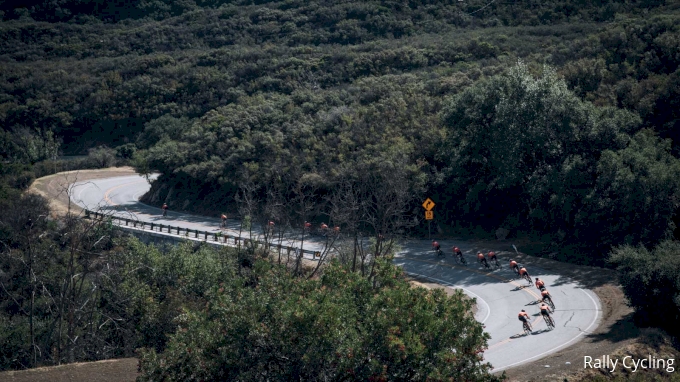
The Rally Cycling men's team trains in the Santa Monica Mountains.
ACT II: Are We Doing This Right?
In February and March, Rally embarked on its ambitious international racing campaign—taking the team to races where the baseline level of talent was greatly heightened, as well as the demands on bike handling, positioning and tactics.
In Spain, competing against WorldTour talent from teams like Astana, Movistar, Mitchelton-Scott, Lotto-Soudal and LottoNL-Jumbo, Rally’s top racers struggled mightily. The UCI, the sport’s governing body, gives each sanctioned stage race an individual ranking from high to low: UCI 2.WT (WorldTour), 2.HC (Hors Categorie, or beyond category), 2.1 and 2.2. Rally primarily competed in UCI 2.HC and 2.1 events, which offer valuable UCI points, and draw a mix of WorldTour teams and second division UCI Pro Continental teams.
Canadian Rob Britton—the team’s go-to GC leader, who won the 2017 Tour of Utah and played a critical role in Huffman’s two Tour of California wins—DNF’d five races in a row. At a UCI 2.1 stage race in Spain, the Volta a la Comunitat Valenciana (where Alejandro Valverde won) Huffman finished 149th. At the Ruta Ciclista del Sol, a UCI 2.HC, the team’s top finisher was Nigel Ellsay—in 73rd, more than 21 minutes down on winner Tim Wellens.
The storyline seemed almost cliche: Dominant North American riders go to Europe with grand aspirations. Get beaten badly. Come home with tail between legs.
Such adversity can cause a team and its staff to seriously question their processes. What are they doing wrong that all these other teams are doing right? Are their racers just not strong enough? Does the team lack the basic infrastructure to compete? Was this a bad idea?
Yet, Rally owner Charles Aaron, its performance director Jonas Carney, and team directors Pat McCarty and Eric Wohlberg, remained calm. They stuck to the plan. “People saw the success we had at the Tour of California and in North America last year, and they think we all of a sudden started doing something different,” Carney said at training camp back in January. “What they don’t realize is this has been a decade long process.”
Since the team’s inception 11 years ago as Kelly Benefit Strategies, Carney has adhered to a few fundamental principles in guiding the growth of the team. He’s invested in young, and underappreciated talent in recruiting riders, and remained loyal to veteran racers who are positive contributors. He’s developed open communication, and a laid back sensibility within the team—without sacrificing team hierarchy or competitive drive. And he’s been very methodical, achieving success at one level of the sport before moving on to the next.
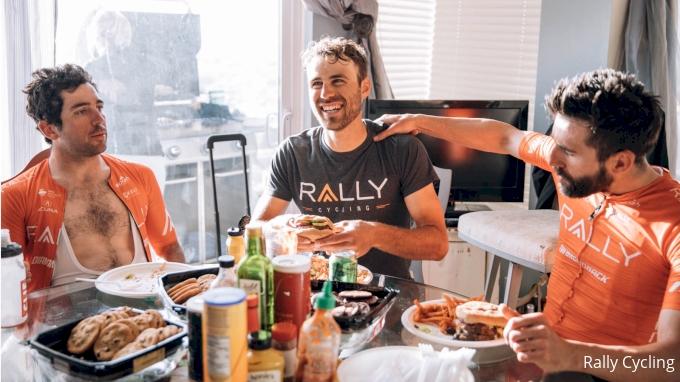
Ty Magner, Jesse Anthony, and Eric Young (L-R) relax after a training ride.
Carney, who ranks as one of the best domestic sprinters of his generation, says, “Of all the teams I’ve been on, there have been some positive aspects and some negative aspects. I really try to take the best aspects from each program that I raced on, and recreate that.”
Carney has also exclusively hired North American riders to Rally Cycling. The entire men’s team is currently comprised of 11 Americans and 5 Canadians.
“We were really one hundred percent committed to having a clean team,” says Carney. “And the only way I could see doing that was hiring riders from North America. Because then I know their coach, I know the people they train with, the people they associate with.”
When vetting a potential rider, Carney says, “If certain names came up, then they wouldn’t be on the team.” Carney says the ability to better vet riders who hail from North America also built a better culture within the team—he could recruit personalities that gelled together.
In 2018, Rally’s management stuck to these founding principles, even as they competed against Pro Continental and WorldTour teams who recruited the top international talent.
In a world where principles are often cast aside in the pursuit of success, such idealistic purity is admirable. Yet, such idealism can be meaningless if you don’t win.
ACT III: The Snowball Effect
There were glimmers of hope in those European spring campaigns. At the Dubai Tour, former junior world time trial champion Brandon McNulty, 20, snuck into a breakaway alongside Rally teammate Robin Carpenter. McNulty attacked the group and rode toward the win alone. Only as the road pitched steeply with 30 meters to the finish line was he finally caught by Bahrain-Merida’s Sonny Colbrelli. The video of McNulty’s valiant effort went viral.
In March, Canadian Adam de Vos, 24, won stage 3 of the Tour de Langkawi, a UCI 2.HC race in Malaysia. On a flat and fast stage, De Vos made the breakaway then attacked to win alone, 13-seconds in front of the field.
On a subsequent trip to Europe, in April, the team took the lessons they learned in February and March and built on them. “The previous races in Europe and the Middle East were very tough and we needed them to be,” said director Pat McCarty.
On the final stage of a UCI 2.1 race in Portugal, McNulty scored a podium finish. He survived snow storms that blew apart the field to factor in the sprint on a steep, cobbled climb. Five days later, at the Vuelta a Castilla y Leon stage race in Spain, 24-year-old Colin Joyce consistently placed in the top ten and finished fourth overall in general classification.
“Believing that you can do something and actually doing it are two different things,” says team communications director Tom Soladay. “What really helps is when the team steps up and actually gets the result. The peloton gets familiar with you and trusts you won’t drop the wheel when the pace gets hard, and positioning is easier. Until then, you have to prove yourself.”
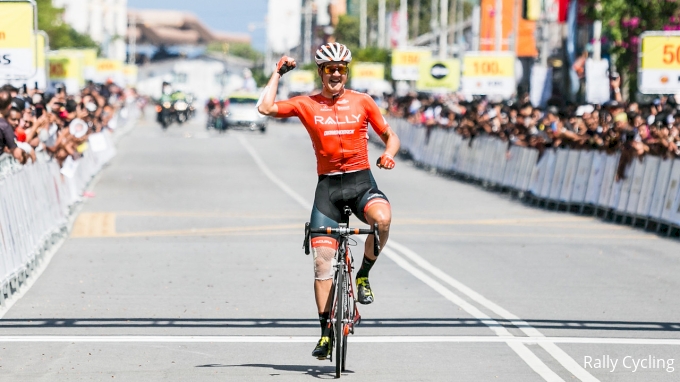
Adam de Vos won stage 3 of the 2018 Tour de Langkawi.
Soladay says Rally’s directors never got down on riders who failed to perform, and instead worked on constructive ways in which to improve. The success began to snowball.
At the Tour de Yorkshire in the U.K., Joyce remained on form. He scored three top ten results in the four day long race and finished 11th overall. (BMC Racing’s Greg van Avermaet won.)
The race organizer at Yorkshire, ASO, took notice. ASO owns the Tour de France, the Vuelta a Espana, Paris-Roubaix, and dozens of other world class events. The race promotion company is considered pro cycling’s most powerful organization—even more so than the governing body, the UCI. After the team’s success in Yorkshire, ASO began extending Rally invitations to some of its smaller but still highly competitive events.
The team performed. At the Arctic Race of Norway, Joyce won a stage and finished third overall, ahead of two pros from BMC. And at ASO’s Deutschland Tour, where Geraint Thomas and Tom Dumoulin (first and second at the Tour de France) headed the start list, Rally breakaway specialist Robin Carpenter, 26, won the King of the Mountains competition.
McCarty says the foundations of that success began well before the team’s official training camp in January. “We’re really starting to realize the importance of off-season camps,” says McCarty, referring to the team’s December gatherings where the focus is more on building social bonds than physical fitness. “This sport’s hard, it’s competitive. If the guys on the team don’t have a group a friends they can fall back on when the season gets tough, then what ultimately gets affected is their performance.”
At the team’s off-season camps, McCarty says half-wheeling on rides is forbidden, and watching football together, playing pick-up basketball, and going out to the bar is encouraged.
“Basically, the first thing the new riders experience is drinking a bunch of beer with the guys,” McCarty says. “If they trust each other, they like each other, they’re having fun, then when they go on the road to races, they like their directors. they like their teammates, they like the staff and it’s a positive environment. That becomes the foundation of the program. From there, we build in the hard work.” Such as the team’s week-long “hammerfest” in Oxnard.
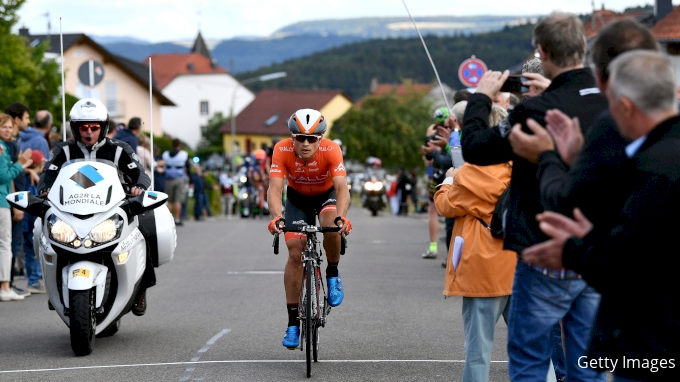
Carpenter won the climber's jersey at the Tour of Germany (Deutschland Tour).
In stage 2 at the Arctic race of Norway, crosswinds began shredding the field with about 50 kilometers left to race. As BMC and Astana put the pressure on the front, Joyce’s teammate Matteo Dal-Cin sacrificed himself to shield Joyce from the wind and move him into position. Both Joyce and Carpenter made the day’s final split, and Robin Carpenter drove the front to keep the group together for a bunch finish. Three BMC riders and Astana’s Jakob Fuglsang were in that lead group, but Joyce beat everyone with a perfectly executed sprint.
“The team has been working really hard for me, so it was nice to get that for them,” Joyce said after the finish. “And show that we belong here.”
Act IV: David And The Giant
Both Grand Prix Cycliste de Quebec and Montreal take place on hilly and technical circuits within the city centers, and cover about 200 kilometers total. The Montreal course, in particular, includes 16 leg-numbing ascents of Mount Royal (1.7 kilometers long at a 7.6 percent gradient). They’re races that tend to select from the back, shedding riders every lap under a punishing pace until an elite group of favorites is left to contest the finish.
Join Pro to watch GP Quebec and Montreal live and on-demand in the U.S.
In theory, the riders on Rally’s roster (all 4 Canadians—Rob Britton, Adam De Vos, Nigel Ellsay and Ryan Anderson—plus Joyce, McNulty, and Carpenter) are well suited to such racing. McNulty and Britton have proven themselves as world class climbers and strong breakaway riders. While Joyce, should he make it to the finish, could factor in a sprint.
A win would be a miracle. A podium, a major victory for the program. A top ten, confirmation that Rally Cycling can compete at this level—that its principles are sound.
Again, Rally Cycling will be a David staring down a Goliath. The team likes to play David.